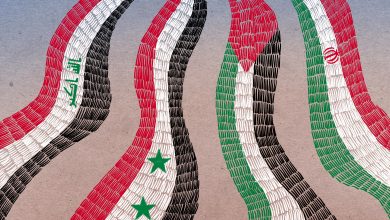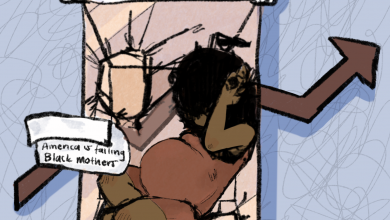On Keeping the Dream Act Alive: Resistance at Home and in D.C.

Photo by Sarah Barukh, “Keep The Dream Act Alive March.”
On February 3, the Coalition for Humane Immigrant Rights (CHIRLA) and CA Dream Network, along with the support of UndocuBlack Network, UndocuMedia, SEIU Local 2015, and the Korean Resource Center hosted the “Keep the Dream Act Alive” March in Westwood. The march began with the gathering and subsequent speeches of those from the listed organizations, other groups, and individuals that showed up purely out of their personal support for the cause.
Angelica Salas is the executive director of CHIRLA, an organization that aims to achieve a society that is fully inclusive of immigrants through the organization and service of individuals. CHIRLA works towards creating institutions and coalitions to build power, transform public opinion, and achieve policies to achieve full human, civil and labor rights. Before the march began, she spoke on the Dream Act and what it meant for the lived experiences of immigrant communities. “I want to let the administration know that we get your scam. What you want to do is ask young people who are fighting for their lives to give up their parents…What you’re asking them to accept is that we have more detentions, and more people in immigration jails. But [let us] be clear, and understand this: liberation says no, no to your cruel deal, no to any more pain in our communities.
Salas also gave context to the day’s events in recognizing that the political battle surrounding the Dream Act started long before the recent government shutdown, and even before the Trump administration gained office. “I want to say to all the immigrant youth that are here today, and all those that have fought before you that have fought for the Dream Act in 2001 and 3 and 4 and 5 and so forth, I just want to say that you are my heroes because you don’t give up, you keep fighting, you show the beauty that you have in you, you build community and you build our nation. You are beautiful.”
The Dream Act (Development, Relief and Education for Alien Minors) was first introduced in April 2001 and was later attached to the Comprehensive Immigration Act of 2006 and 2007. In 2010, the bill passed the House, but was five votes short in the Senate even though both chambers were controlled by Democrats. The Senate version of the Dream Act, introduced in July 2017, allows current, former, and future undocumented high-school graduates and GED recipients a three-step pathway to U.S. citizenship through college, work, or the armed services. However, Congress has still not been able to pass a long-term spending bill due to the different sentiments each party holds in regards to this issue, which is why President Donald Trump, with the approval of the House and Senate, signed a spending bill on February 9 to keep the government operating and funded until March 23rd.
The conversation regarding the Dream Act and who it impacts does not fully address the issues immigrant communities face, which is why immigrant activists are demanding a clean Dream act: one that would create a pathway to U.S. citizenship without using young immigrants to further harm immigrant communities. In practice, this would mean a deal without funding for a border wall and increased border security, interior enforcement, detention centers or mandatory E-Verify.
It is clear to most that although President Trump touts his “great love” for Dreamers, he sees them as a bargaining chip. Both he and the Republican party are willing to uproot the lives of thousands of individuals unless they are promised the funding necessary to build the much discussed border wall. However, immigrant activists like Michelle Xai, a member of Refuse Fascism, recognize that the issue of getting the Dream Act passed is not strictly partisan, as she explains “…Dreamers are being used as bargaining chips by the Democrats and all the while, millions of people who are undocumented– their lives are hanging literally by a thread.” What Xai aptly points out is immigration reform is both a short and long term battle. Both parties need to work on a solution that keeps the lives of those 700,000 people secure through a stand-alone bill, while keeping the goals of the clean Dream Act alive in further negotiations.
It is a fact that moderate Democrats have impeded the success of the Dream Act. Both before and during the Trump administration, the fears of losing office for such politicians have led them to vote in favor of their careers rather than what would be in the immigrant community’s best interest. However, long-term and short-term battles are being fought on this front, and it is important that effort be put into both.
Presently, there are ten Senate Democrats up for re-election in Trump-favoring states. Some believe that the Democrats’ willingness to move forward with the temporary spending deal was meant to give such Democrats a fighting chance in winning their elections. This act of compliance in it of itself is not a betrayal to those that wish to see a clean Dream Act passed, but only so long as such Democrats use their solidified power to demand Dreamer’s and undocumented individual’s rights above all else.
Those that are undocumented and their supporters have made it clear that they won’t support anything less. The march eventually moved into Westwood Village and across Wilshire Boulevard as those in the crowd chanted “If they won’t let us dream, we won’t let them sleep.”




